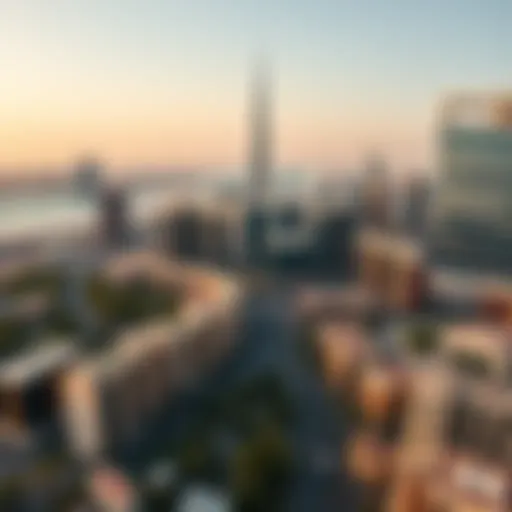Ramadan 2023 UAE Calendar: Insights on Dubai's Traditions
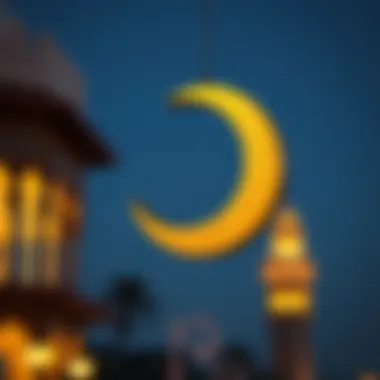
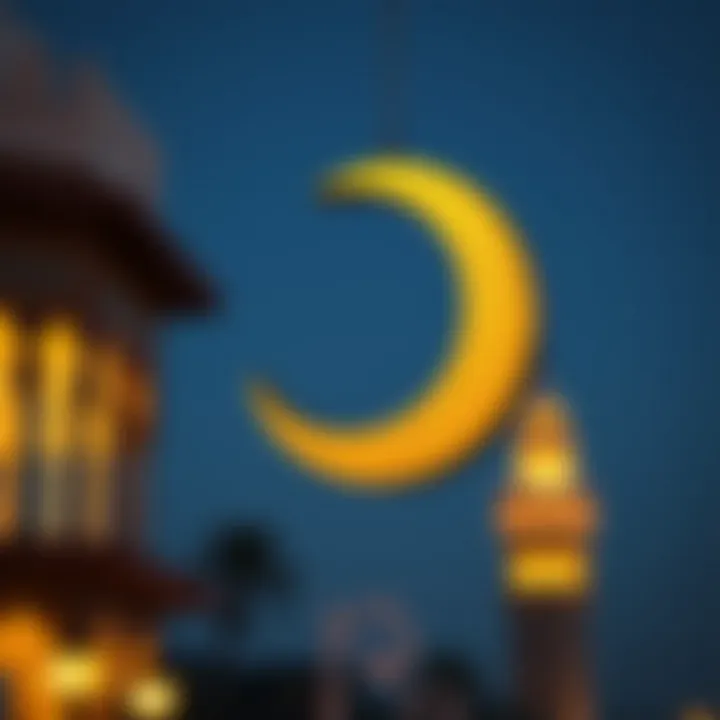
Intro
As the crescent moon appears, marking the beginning of Ramadan, Dubai transforms into a vibrant tapestry of cultural and spiritual significance. For Muslims in the United Arab Emirates, and particularly in such a cosmopolitan hub as Dubai, Ramadan is more than just a month of fasting; it's a time for community, reflection, and notable economic shifts. This guide will navigate through the unique aspects of Ramadan in Dubai for 2023, with a keen focus on how this sacred month influences various sectors, especially real estate.
Market Insights
Current Trends in Dubai Real Estate
During Ramadan, there tends to be a noticeable shift in the Dubai real estate landscape. Many investors and homebuyers often reassess their strategies, drawing on the cultural practices and economic climate of the period.
Current trends show that properties near mosques or community centers become more sought after, as the faithful seek convenience for prayer and communal gatherings. Additionally, restaurants and entertainment venues adapt their offerings, often creating tailored experiences such as Iftar tents, which can serve to attract both local and international interest.
Movers and shakers in the real estate scene find that transactions slow down initially as families focus on spiritual commitments. However, as the month progresses, activities often pick up, especially in the weeks leading to Eid al-Fitr. This period can create opportunities for savvy investors looking to capitalize on reduced competition in the market.
Market Forecast and Predictions
Predicting the impact of Ramadan on the Dubai abode sector reveals some intriguing possibilities. Analysts project a surge in rentals towards the end of Ramadan, largely driven by expatriates seeking temporary accommodations ahead of Eid celebrations or new arrivals preparing to settle in the region. The scarcity of supply due to seasonal trends may further propel rental rates.
A study from the Dubai Land Department indicates a trend where buyers tend to favor larger villas and family-oriented communities during this period. With communal activities and the emphasis on family during Ramadan, larger properties become more appealing. This could lead to a persistent demand that might extend beyond Ramadan, buoying prices in key residential areas.
"Real estate dynamics during Ramadan reflect not only cultural practices but also deepen community ties, investing emotionally and financially into the region."
Buying and Selling Guide
Steps to Purchase Property in Dubai
If you're considering investing in Dubai during Ramadan, understanding the process is key. Here are the fundamental steps:
- Research the Market: Look into properties that cater to the needs of the Muslim community, especially those located near mosques and community hubs.
- Engage a Real Estate Agent: It’s vital to partner with an agent familiar with the local market and Ramadan-specific trends.
- Site Visits: Even amid fasting, prioritize viewings, particularly in the evenings when energy rises.
- Negotiate Terms: With the temporary slowdown, buyers might find that sellers are more amenable to negotiation.
- Finalize the Purchase: Be mindful of the paperwork and regulations, ensuring all documents are correctly submitted online—many authorities in UAE have streamlined processes to facilitate during Ramadan.
Essential Tips for Sellers
For those looking to sell their properties during Ramadan, here are some essential tips:
- Market during Iftar: Utilize the evenings when families gather and are more likely to explore new homes.
- Highlight Cultural Features: Emphasize aspects of the property aligned with communal living and gatherings to better attract buyers.
- Adjust Marketing Strategies: Integrate Ramadan themes into listings to resonate more with potential buyers.
- Be Flexible with Showings: Make accommodations to show the property during non-fasting hours, especially after sunset.
In summary, while Ramadan provides opportunities, it also brings unique challenges. For both investors and residents, understanding these dynamics creates a path toward informed decision-making in the ever-evolving real estate market of Dubai. By blending cultural insights with market knowledge, one can navigate this auspicious month effectively.
For further details about real estate trends, you might find these resources helpful:
Dubai Land Department
UAE Government
Investopedia - Real Estate Market
Understanding Ramadan
Understanding Ramadan is pivotal for anyone keen on exploring the social, cultural, and religious aspects of life in Dubai, especially during 2023. This holy month is more than just a period of fasting; it goes deep into the roots of Islamic traditions and values, serving as a profound time for reflection and community bonding. As the sun sets, it unveils a plethora of customs and practices that truly characterize the uniqueness of this region.
Historical Context
To grasp the essence of Ramadan, one should look back at its historical roots. This month commemorates the moment when the Qur'an was first revealed to the Prophet Muhammad, marking it as a time for spiritual awakening and introspection. Historically, the practice of fasting, known as sawm, has been traced back to the early communities who sought to purify their minds and bodies in dedication to God. This observance has evolved, but its core remains untouched.
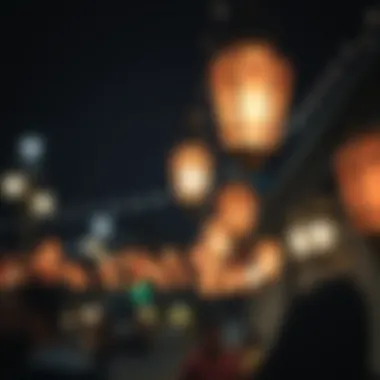
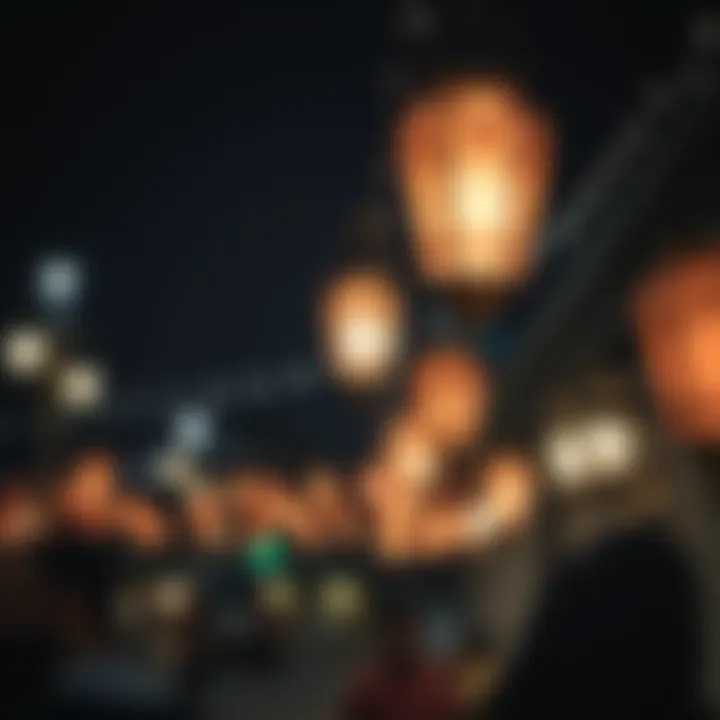
In the contrast between ancient practices and contemporary observations, the importance of Ramadan is further illuminated. Communities historically faced food shortages and famine, which necessitated the day-long fasts, making the connection to empathy and sharing even more vital in today’s cultural practices.
Cultural Significance
The cultural significance of Ramadan extends beyond merely abstaining from food and drink. It colors every aspect of life, infusing the atmosphere with a sense of unity and togetherness. Families come together each evening to break their fast, known as iftar, sharing a meal that often includes dates, water, and an array of dishes that showcase traditional Emirati cuisine. This illustrates a cultural embrace that showcases not just culinary delights but also communal bonds.
Moreover, various cultural events during Ramadan resonate through art, music, and public celebrations. Streets and homes are adorned with lanterns and lights, creating a picturesque view that adds to the festive ambiance. The storytelling and poetry exhibitions often highlight the themes of giving and compassion prevalent during this month, creating an enriching cultural tapestry that evolves year after year.
Religious Observations
Religious observations are central to Ramadan. Fasting extends beyond the act of refraining from eating; it encompasses a holistic approach towards spiritual purification. Muslims engage in additional prayers, particularly during the night, with three notable practices: Taraweeh, Tahajjud, and reciting the Qur'an. This is a time for seekers, reflecting on their faith while engaging in more charitable acts.
It's fascinating that beyond just individual growth, communal prayers play such a crucial role. The sense of belonging felt can be profound, as mosques fill with worshippers each night, showing the spirit of unity among not just Muslims in Dubai, but around the globe.
In summary, understanding Ramadan in Dubai, particularly in 2023, is a gateway to appreciate the depth of cultural heritage, the rich history, and the religious practices that navigate daily life during this holy month. For investors and residents alike, recognizing these elements is essential not just on a personal level, but as part of the broader societal framework that impacts real estate and communal dynamics considerably.
"Ramadan is not just a month of fasting; it is a journey towards peace, a reflection on our duties, and an effort to connect deeply with ourselves and our communities."
Ramadan UAE Calendar Overview
The significance of the Ramadan 2023 UAE Calendar cannot be overstated, particularly when focusing on Dubai. It serves not only as a scheduling guide for the rituals and practices of this holy month but also as a reflection of the cultural and social fabric of the region. The calendar encapsulates the essence of Ramadan, providing insights into prayer timings, communal gatherings, and the unique observances that characterize this period. For investors, homebuyers, agents, developers, and analysts, understanding the ins and outs of the calendar is essential for navigating the dynamics of life in Dubai during this time.
Start and End Dates
Ramadan is a lunar month, which means its exact timing shifts annually based on the sighting of the moon. In 2023, residents can expect Ramadan to commence on the evening of March 22, culminating on the evening of April 21. However, it's important to note that these dates can shift slightly, contingent on local moon sightings.
This ambiguity serves as a reminder of the adaptability and unpredictability inherent in Islamic observance, further enriching the living experience in Dubai. Investors and residents alike should mark these dates and remain flexible, as the start and conclusion of Ramadan may affect various aspects of daily life, including work schedules, community events, and business operations.
Important Dates to Remember
Beyond the start and end dates of Ramadan, certain days within this month hold special significance. These include:
- Laylat al-Qadr (Night of Decree): Expected to be observed in the last ten days of Ramadan, likely around April 17, this night is believed to be more rewarding than a thousand months. It’s a time for sincere devotion, prayer, and reflection.
- Eid al-Fitr: Set to be celebrated on April 21, Eid marks the end of fasting, and is a festive occasion filled with family gatherings and communal prayers. Preparation for Eid begins early, with shopping for new clothes and planning elaborate meals.
Being aware of these important dates helps one to participate fully in the rituals and community events. For investors, understanding these timings can also provide context about market fluctuations and consumer behavior, which can influence investment decisions.
Daily Prayer Timings
In Ramadan, prayer timings shift slightly as it aligns with the fasting schedule. Fajr, the morning prayer, marks the start of the fast, while Maghrib, the evening prayer, signifies its end. Here are the approximate prayer times for Dubai during Ramadan 2023:
- Fajr (Morning Prayer): Around 4:45 AM
- Dhuhr (Noon Prayer): Around 12:15 PM
- Asr (Afternoon Prayer): Approximately 3:30 PM
- Maghrib (Evening Prayer): Approximately 6:45 PM
- Isha (Night Prayer): Around 8:15 PM
Keeping track of these timings is vital for those observing the fast, as it impacts eating plans and social gatherings. Digital apps and local mosques usually provide updated prayer times to ensure everyone stays aligned with their spiritual practices.
In summary, the Ramadan 2023 UAE Calendar Overview provides essential insights into the rhythm of life in Dubai during this sacred month. For those involved in the real estate market, understanding the communal nuances and the significance of these observances becomes invaluable, shaping strategies and decisions in the months leading up to and during Ramadan.
Ramadan Traditions in Dubai


In Dubai, Ramadan is more than just a month of fasting; it encapsulates a blend of tradition, community, and devotion. The way people observe this holy month reflects the cultural richness of the UAE, and these traditions foster a sense of unity, enhancing the spiritual atmosphere of the city. Insights into these customs not only spotlight the local way of life but also present a significant overview for investors and new residents, highlighting aspects that contribute to the city's vibrancy.
Iftar and Suhoor Customs
Iftar, the evening meal that breaks the fast, serves as a cornerstone of Ramadan traditions in Dubai. Families and friends gather to share delicious meals, often beginning with dates and water, before progressing to a variety of dishes that reflect the culinary diversity of the region. Favorites include lamb dishes, saffron rice, and a variety of sweets—each of these items tell a story about the culture and unity during this time.
Moreover, local restaurants and hotels often offer lavish buffets, creating a festive atmosphere to enjoy shared meals. The spirit of generosity is palpable; it's common for people to invite others, regardless of their background, to join in the festivities. For tourists, these iftar meals provide a genuine experience of Emirati culture, shining a light on hospitality that is deeply ingrained in the UAE's traditions.
Suhoor, the pre-dawn meal, holds its own importance. It's a time for families to come together before fasting begins for the day. This meal often consists of nutrient-rich foods to prepare individuals for the hours ahead. The peacefulness of early morning adds a reflective nature to suhoor, setting the tone for the day ahead. This shared experience reinforces community bonds, creating connections that last beyond the month of Ramadan.
Community Gatherings
In Dubai, the communal aspect of Ramadan spans beyond family dinners. Community gatherings are an integral part of the holy month. Many neighborhoods organize communal iftar tents, where locals and visitors alike are welcomed to break their fast. These gatherings foster a sense of togetherness while also showcasing the emirate's diversity.
Sharing meals in a communal setting fosters conversations, friendships, and mutual understanding. The tents are decorated with lights and offer traditional entertainment, enhancing the experience. For real estate stakeholders, these events signify the lifestyle appeal of various areas, hinting at where community and belonging thrive among residents.
One major gathering event is the Ramadan Night Market, which offers everything from food stalls serving local delicacies to traditional crafts. This kind of market is not just a place of commerce but represents a hub for cultural exchange during the holy month, making it a pivotal feature for anyone considering the area's investment potential.
Charitable Practices
Charity plays a critical role during Ramadan in Dubai, underpinning the month’s significance of giving. Many citizens and residents engage in acts of kindness, supporting the less fortunate through donations, food drives, and organized charity events. Organizations and mosques are often at the forefront, running initiatives to distribute food and essentials to those in need.
The practice of Zakat, which is one of the Five Pillars of Islam, emphasizes the importance of supporting the underprivileged during this month. This dedication to charitable practices not only reflects the moral foundations of Islam but also enhances community welfare, signaling a collaborative spirit among residents.
Participants often volunteer their time or resources, establishing an interconnected web of support across the city. For investors, understanding these dynamics is crucial; areas known for strong community ties and charitable engagement often sustain higher property values as they attract families and individuals looking for a supportive environment.
In summary, the traditions surrounding Ramadan in Dubai are multifaceted and encompass more than just religious observances. They build community, reflect cultural heritage, and present opportunities for social and economic engagement, making them essential to comprehend for anyone looking to navigate the landscape during this significant month.
Impact of Ramadan on Dubai's Real Estate Market
Ramadan, a sacred month of fasting and spiritual reflection for Muslims, brings a unique rhythm to Dubai. Beyond its cultural importance, Ramadan creates noticeable shifts in the local real estate market that savvy investors and stakeholders should be keenly aware of. During this month, several factors come into play that directly affect property dynamics, rental trends, and investment opportunities.
Shifts in Market Dynamics
The impact of Ramadan on market dynamics can be quite intricate. First off, with many businesses operating on reduced hours, there’s often a slowdown in retail activity and commercial transactions. This change creates a temporary dip in the demand for commercial properties, as business owners adjust to the fasting schedules of their employees and consumers.
On the flip side, residential neighborhoods see an uptick in activity. Families often prioritize living arrangements that are close to mosques and community centers for ease of access during prayers.
- Islamic Financing: Some might notice an increased interest in properties that offer Islamic mortgage options, as investors align their purchases with religious practices.
- Community Appeal: Buildings with family-friendly amenities, like pools and recreation areas, become hot commodities as many look to host family gatherings for iftar.
Rental Trends During Ramadan
As the sun sets and families break their fasts, the demand for certain types of rentals shifts. This month creates distinct patterns in the rental landscape:
- Short-Term Rentals Surge: Areas that mark special Ramadan events often see a rise in short-term rental leases. Visitors flock to Dubai to experience the festive atmosphere and cultural events.
- Increased Rental Prices: For properties near mosques or central iftar venues, rental prices may see a spike due to heightened demand from those wanting to enjoy community festivities.
Though there can be higher rates during this period, it is crucial for landlords to balance prices to retain long-term tenants who may budget differently during this spiritual month.
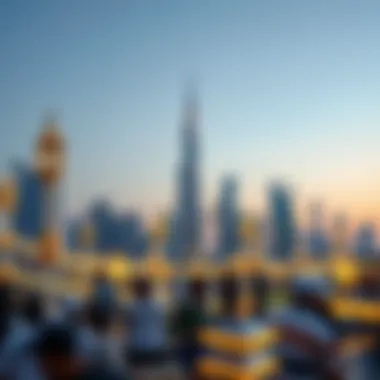
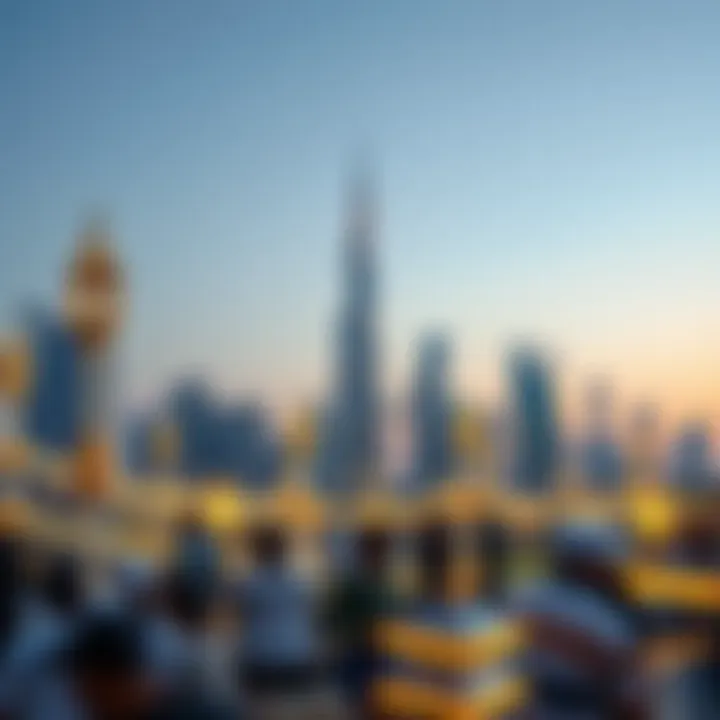
Investment Opportunities
While certain sectors may feel a pinch during Ramadan, this month can be an opportune time to reassess and target investments wisely:
- Buying During the Lull: Investors might find that Ramadan presents a prime opportunity to negotiate better deals on properties, as some sellers may be more motivated to close deals during the quieter month.
- Focus on Community Developments: Properties aligning with community needs, offering amenities conducive to family gatherings, may appeal as long-term investments.
- Fostering Relationships: For developers and real estate agents, Ramadan can serve as a time to build community ties and trust. Engaging with local charities or events can foster goodwill, translating into future business opportunities.
"Understanding the cyclical nature of Dubai's real estate market during Ramadan is crucial for both investors and inhabitants. It's a time of reflection and community that also holds the potential for savvy investments."
By recognizing these trends and shifts, stakeholders and investors can make informed decisions that align with the unique rhythm of Dubai during this holy month. With a warm atmosphere built on community bonds, Ramadan not only changes daily life but also presents intriguing possibilities in the property market.
Navigating Life in Dubai During Ramadan
As Dubai embraces the sacred month of Ramadan, life for both locals and expatriates undergoes significant changes. Understanding these shifts is crucial not only for the Muslim community observing the fast but also for non-Muslims who coexist in this vibrant city. Navigating life in Dubai during this holy month encapsulates an array of adjustments, considerations, and respect for the cultural tapestry that entwines the city's identity. This section puts a spotlight on the essential elements that every individual—be it a resident, investor, or visitor—should consider to ensure a smooth experience.
Adjusting Daily Routines
Observing Ramadan means altered schedules for many. Muslims wake up before dawn for Suhoor, the pre-dawn meal, followed by a day of fasting until sunset where they break their fast with Iftar. This transition affects the daily rhythms of life.
- Work Hours: Most businesses adjust their working hours, often starting later in the day. For instance, shops and offices may open around 10 AM and close by the late afternoon. Employers typically reduce working hours, which means employees may find themselves with a more flexible schedule, ideal for spiritual reflection or community engagement.
- Meal Times: Meal timings shift drastically. Restaurants and cafes might close during the day, reopening only after sunset. As such, it’s prudent to plan meals around Iftar and Suhoor timings to avoid inconvenience.
- Transport: Public transport may also experience changes, with some services altered or boosted around Iftar times to accommodate the influx of celebrators breaking their fast.
Considerations for Non-Muslims
For those who do not observe the fast, understanding how to navigate this period with sensitivity is essential. Dubai prides itself on tolerance and inclusivity, yet being mindful of local customs can enhance the experience.
- Fasting Norms: Non-Muslims can eat and drink in private settings but should refrain from eating, drinking, or smoking in public during daylight hours. Most places accommodate non-Muslims by providing special areas for dining.
- Cultural Engagement: Ramadan is more than fasting; it's about community and spirituality. Non-Muslims may engage in inviting local friends to Iftar gatherings, which often take place in homes or community centers.
- Events and Activities: There are also opportunities to attend cultural events that unfold during this month. Markets often spring up with food, art, and cultural exhibitions, providing a delightful glimpse into the traditions coalescing within the emirate.
Respecting Local Customs
Respecting customs goes a long way in nurturing community relationships and fostering positive interactions during Ramadan.
"A little kindness goes a long way; understanding will pave the path to harmony in diversity.”
- Dress Code: Modesty is emphasized during Ramadan. Dressing appropriately in public not only shows respect for the holy month but reflects the values of the local culture. Light, loose-fitting clothing is advisable, with an emphasis on covering shoulders and knees.
- Quiet Spaces: Given that Ramadan is a time for reflection and peace, keeping noise levels down in public settings, especially during prayer times, is appreciated.
- Community Contributions: Engaging in charitable activities during Ramadan is not limited to Muslims. Non-Muslims can participate in food donations or volunteer for community initiatives, acknowledging the spirit of giving.
Navigating life in Dubai during Ramadan is an exercise in cultural diplomacy, presenting both an opportunity for personal growth and a chance to practice empathy and respect for the long-standing traditions of the region.
Closure
The significance of Ramadan in Dubai extends far beyond its religious foundations; it permeates various aspects of daily life, commerce, and community interactions. As we reflect on what Ramadan represents within the bustling environment of Dubai, a few key elements emerge that shape the experiences for both locals and newcomers alike.
Reflections on Ramadan in Dubai
Ramadan offers a unique lens through which to view the culture and traditions of Dubai. The month is marked by fasting from dawn until sunset, yet it's also a time of profound spiritual reflection, community bonding, and heightened charitable endeavors. From the sound of the adhan echoing through the city, inviting individuals to pause and reflect, to the communal iftar meals shared among families and friends, every corner of Dubai vibrates with religious significance. Many buildings, streets, and public spaces are adorned with beautiful lights and decorations that serve as a visible reminder of this sacred time.
Moreover, the atmosphere during Ramadan encapsulates a spirit of generosity and hospitality. Restaurants and cafes that typically operate throughout the day open their doors again in the evening, offering diverse iftar menus that reflect the emirate's multicultural tapestry. This cultural amalgamation also extends to events and activities that cater to both local and expatriate populations, ensuring that everyone can partake in the celebrations, regardless of their background.
It's essential to acknowledge that the rhythm of life during Ramadan takes on a different beat. Companies often adjust their working hours, allowing employees to balance their professional responsibilities with personal observances. Such adjustments contribute to a palpable sense of flexibility and understanding among the populace, fostering goodwill and camaraderie.
Importance for Real Estate Stakeholders
For stakeholders engaged in Dubai's dynamic real estate market, Ramadan can have significant implications. Investors and developers often observe a shift in market dynamics during this holy month. The heightened sense of community and increased social activities can lead to a rise in demand for properties that can facilitate gatherings, such as larger homes or community-centric developments. Additionally, rental trends often evolve, with short-term leasing spiking as people seek accommodations for iftar gatherings or communal events. Understanding these trends is critical for making informed investment decisions.
Moreover, during Ramadan, there's an increased focus on charitable contributions, with many real estate companies initiating philanthropy aligned with this spirit. This not only enhances their corporate social responsibility portfolios but also strengthens their reputational capital in the eyes of the community.
The convergence of culture and commerce during Ramadan presents unique opportunities and challenges for real estate stakeholders; understanding these factors is crucial in guiding their strategies and decisions. As Dubai continues to evolve, being attuned to the rhythms of its diverse populace, particularly during significant periods like Ramadan, can yield great benefits for those navigating the market.











